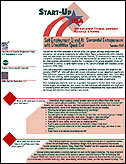
Information, resources and research about work and disability issues
Upcoming VCU CRP-RCEP Webcast
|
Creative Employment Strategies Date: 6/10/2008 Time: 2:00pm ET Presenter: Wendy Parent |
This webcast will explore customized and supported employment strategies that have been successfully used by individuals with significant disabilities to become competitively employed. Emphasis will be placed on looking beyond typical service delivery practices to include generic, disability, natural supports and funding resources.
Case study examples illustrating the process of customizing jobs and supports and the outcomes that can be achieved will be highlighted. Practical strategies for establishing individualized employment teams, implementing customized employment, accessing nontraditional resources, and addressing local service delivery issues will be presented. Register for this Webcast
This activity is funded by grant (RRTC) #H133B040011 with the US DOE - NIDRR and by grant (CRP-RCEP) #H264B050007 with the US DOE - RSA.
Quality Indicators for Review of Competitive Employment Qutcomes for Veterans with a Disability Form
 The Quality Indicators form is a check list based on 7 indicators that HVRP programs can use to evaluate the quality of the employment services provided to homeless veterans. Probe questions are provided to assist in determining the extent to which its services and outcomes are consistent with the defined quality indicator. The format includes a Current Status Code scale for assessing program practices in relation to each indicator. Finally, a Priority Code for Attention scale is provided to note areas that need attention for improvement. Program managers and staff of the employment program in working together to complete the assessment can note the current status of services provided in relation to the indicator and can establish a priority for follow-up attention in areas where current practices are not representative of higher quality services and employment outcomes. View the form
The Quality Indicators form is a check list based on 7 indicators that HVRP programs can use to evaluate the quality of the employment services provided to homeless veterans. Probe questions are provided to assist in determining the extent to which its services and outcomes are consistent with the defined quality indicator. The format includes a Current Status Code scale for assessing program practices in relation to each indicator. Finally, a Priority Code for Attention scale is provided to note areas that need attention for improvement. Program managers and staff of the employment program in working together to complete the assessment can note the current status of services provided in relation to the indicator and can establish a priority for follow-up attention in areas where current practices are not representative of higher quality services and employment outcomes. View the form
HVRP (Homeless Veterans Reintegration Project) Technical Assistance Center is funded by grant #HV-16488-07-75-5-51with the US DOL.
Register for the Next 2008 Online Courses
Offered August 18 - November 10
Supported Employment Web-based Certificate Series - This online course provides an extensive overview of supported employment and how to facilitate competitive jobs for individuals with significant disabilities. Topics include:
- Federal Policy and Overview Customer Profile
- Marketing and Job Development
- Job-Site Support
- Special Topics
- Long Term Supports & Funding.
Earn 3.5 CEUs or 35 CRCs, and a certificate of completion. Cost: $250 per individual or 5 participants for $1,000. Find Out More and Register Online
Supported Competitive Employment for Individuals with Mental Illness - This online course provides an extensive overview of supported competitive employment for individuals with mental illness. Sessions will include these topics:
- Overview and Values Base
- Building Relationships with Business
- Establishing a Career Direction
- Locating Work Opportunities
- Employment Support
- Funding & Other Topics.
Earn 3.5 CEUs or 35 CRCs, and a certificate of completion. Cost: $250 per individual or 5 participants for $1,000. Find Out More and Register Online
Upcoming RRTC-HVRP Complimentary Webcast
|
Helping Veterans to Connect with Businesses Date: 6/19/2008 Time: 2:00pm ET Presenters: Howard Green & Katherine McCary Connecting with Business is critical for all community rehabilitation service providers in order to be successful in their efforts to achieve employment outcomes for people with disabilities including disabled homeless veterans. |
Register for this Free Webcast
This activity is funded by grant (RRTC) #H133B040011 with the US DOE - NIDRR and by grant (HVRP) grant #HV-16488-07-75-5-51with the US DOL.
START-UP/USA Self-Employment Fact Sheet
 Disabled Veterans and Self-Employment
Disabled Veterans and Self-Employment
According to the Small Business Administrations’ (SBA’s) Office of Veterans Business Development, the number of veteran-owned businesses stands at more than 4-million. However, service-disabled veterans are self-employed at a rate significantly lower than the veteran population as a whole, according to a study released by the Office of Advocacy of the U.S. Small Business Administration.
The needs and challenges experienced by veterans with disabilities often require a different and innovative mode of self-employment structure, management, marketing, and operations than those experienced by other individuals with disabilities. This Q and A on self-employment for veterans with disabilities and service-connected disabilities provides information on resources that are available to assist them in starting and operating a business.
Start-Up-USA is funded by cooperative agreement # E-9-4-6-0111 from the U.S. DOL-ODEP.
Journal of Vocational Rehabilitation Article
Choice & customized employment: A critical component
Community Rehabilitation Providers (CRPs) often report that individuals with disabilities prefer to stay in facility-based programs rather than move into “real jobs” in community businesses. Certainly, all CRPs want to support individuals with disabilities in their job choices. However, service providers must also empower individuals with disabilities to make informed choices and promote active participation in the decision making process.
This “Customized Employment Corner”addresses some of the commonly asked questions related to empowering individuals to move from segregated facility-based programs to integrated community employment.
National Institute on Disability and Rehabilitation Research (#H133B040011)
1314 West Main Street | P.O. Box 842011 | Richmond, Virginia 23284-2011
Phone: (804) 828-1851 | TTY: (804) 828-2494 | Fax: (804) 828-2193
| | |


